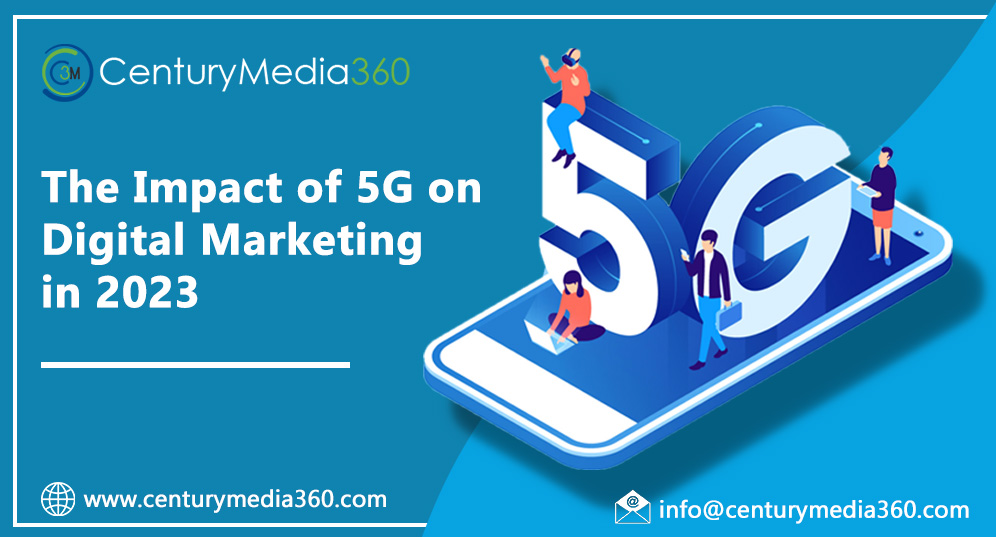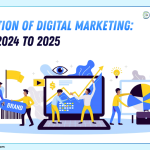The Impact of 5G on Digital Marketing in 2023

The advent of 5G technology is poised to revolutionize the world of digital marketing, bringing faster speeds, lower latency, and improved connectivity to the table. With 5G set to become widely available in 2023, it’s important for businesses and marketers to understand how it will impact the way they connect with their audience. In this blog, we’ll explore the potential impact of 5G on digital marketing, and how marketers can prepare to take advantage of this exciting new technology.
Increased Speed and Reduced Latency
One of the most significant benefits of 5G technology is its increased speed and reduced latency. With 5G, data transfer speeds will be up to 100 times faster than 4G, allowing for lightning-fast downloads, smoother streaming, and near-instant website load times. This will be particularly important for marketers who rely on video and multimedia content, as it will eliminate buffering and allow for a seamless viewing experience.
Moreover, the reduced latency offered by 5G technology will make real-time communication possible for the first time, meaning that businesses will be able to engage with customers in real time, wherever they are. This will revolutionize the way marketers communicate with their target audience and make it easier to deliver personalized, real-time marketing messages.
Improved Connectivity and Accessibility
Another major advantage of 5G is its improved connectivity and accessibility. With 5G, more people will be able to access high-speed internet, even in rural and remote areas, which will increase the reach of digital marketing campaigns. This will also allow for greater collaboration between businesses, making it easier for them to work together and reach new audiences.
The Rise of Virtual and Augmented Reality
Virtual and augmented reality (VR/AR) technology has been on the rise in recent years, and with the advent of 5G, we’re set to see an explosion of VR/AR marketing content. 5G technology will make VR and AR experiences faster and more seamless, allowing for immersive and interactive marketing experiences that will engage and delight customers.
The Growth of the Internet of Things (IoT)
The Internet of Things (IoT) is set to grow dramatically in the coming years, with 5G playing a major role in driving this growth. With 5G, businesses will be able to connect more devices to the internet, collect and analyze data from these devices in real time, and use this data to inform their marketing decisions. This will help businesses to create more targeted and personalized marketing campaigns, as well as making it easier to automate and optimize marketing processes.
The Emergence of New Marketing Channels
5G technology is also likely to lead to the emergence of new marketing channels, as businesses look to take advantage of the new opportunities that this technology presents. For example, 5G-enabled smart cities will allow for the creation of new digital advertising opportunities, such as location-based advertising and digital billboards.
The Importance of Adaptability
While the impact of 5G on digital marketing is likely to be significant, it’s important for businesses and marketers to be adaptable and able to embrace new technologies as they emerge. By being open to new ideas and willing to experiment with new marketing channels and technologies, businesses will be able to stay ahead of the curve and continue to reach their target audience effectively.
Key Considerations for Digital Marketers
As businesses prepare to take advantage of 5G, there are several key considerations that digital marketers should keep in mind.
• Plan for increased mobile connectivity: Businesses should ensure that their digital content is optimize for mobile devices and that it is able to take full advantage of 5G speeds and bandwidth.
• Focus on customer experience: Businesses should focus on delivering an enhanced customer experience by providing faster and more responsive digital content. This will help to drive increased engagement and conversions.
• Invest in new technologies: Digital marketers should invest in new technologies like AR, VR, and AI to stay ahead of the curve and take full advantage of the opportunities presented by 5G.
• Stay up-to-date with industry developments: Finally, digital marketers should stay up-to-date with the industry to not fall behind from their competitors.






